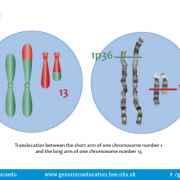Definition
A type of genetic variant where part of one chromosome has moved, either to a separate chromosome or to another part of the same chromosome.
Use in clinical context
Chromosome translocations can either be balanced, with no loss or gain of genetic material, or unbalanced, with a gain or loss of genetic material. With all types of translocations there is the risk that at the break point there is a gene or other functional part of the genome. Translocations can disrupt functional parts of the genome and have implications for protein production with phenotypic consequences.
Balanced translocations may not have any apparent effect on an individual but can become unbalanced in their offspring if the pair of chromosomes where genetic material has been exchanged is not inherited together. Unbalanced translocations can result in missing genes or extra copies of genes, which can have functional implications.
It is possible to see large translocations using a karyotyping. Smaller translocations can be detected using microarrays and sequencing.
Related terms
Chromosome | Deoxyribonucleic acid (DNA) | Gene | Genetic/genomic variation | Genome | Karyotype | Microarray | Phenotype | Protein | Sequence




